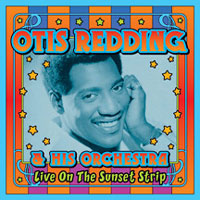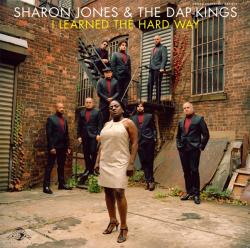
OTIS REDDING’S 2-CD LIVE ON THE SUNSET STRIP DOCUMENTS HISTORIC 1966 CLUB DATE AT THE ARTIST’S PEAK OF POWER
Three full sets available in their entirety for the first time,
with digital remastering and extensive liner notes
LOS ANGELES, Calif. - In 1966, Otis Redding had emerged not only as the star of Stax Records but as one of nation's most influential soul singers. With his version of "Satisfaction" climbing the charts in April 1966, Redding arrived in Los Angeles to play both the Hollywood Bowl (as part of a KHJ-AM listener appreciation concert that also featured Donovan, Sonny & Cher and the Mamas & the Papas) and a four-nighter at the legendary Whisky A Go Go on the Sunset Strip. According to Taj Mahal, whose '60s band the Rising Sons opened the Whisky shows, "At that time, Otis was it."
Live on the Sunset Strip, slated for May 18, 2010 release on Stax Records through Concord Music Group, captures Redding in the white heat of transition, when his star power was undeniable and it was still possible to catch him backed by his own road band in the tight quarters of a smoky nightclub. The 2-CD set features three full live sets that have never been previously available in their entirety. A definitive live statement from Redding, the songs are sequenced exactly as they went down, complete with an emcee and spoken introductions by Redding. The booklet features rare photographs as well as extensive liner notes by Ashley Kahn, author of music biographies and a contributor to NPR's Morning Edition.
Live on the Sunset Strip highlights versions of Redding's best-known songs: "I've Been Loving You Too Long," "Security," "I Can't Turn You Loose," "Satisfaction," "Respect," "These Arms of Mine" and "Just One More Day," to name a few.
As Kahn points out in his notes, "In 1966, Redding was 24 and defined not only the sound but the style and look of a true soul man. Tall and lanky, he was ready to drop to his knees and tear off the thin-lapelled jacket of his sharply pressed suit when it was time to deliver the goods. His ten-piece band was his personal, traveling amen-corner, urging him to testify night after night . . . His out-of-breath stage patter was warm and downhome. ‘Ladies and gentlemens,' he addressed his fans, ‘holler as loud as you wanna - you ain't home!'"
The Whisky A Go Go was known for its integrated booking policy and for helping bring awareness of R&B and blues to rock audiences, who attended shows by the Doors, Love, and the Standells at the venue. On April 7-10, the club booked the Otis Redding Revue for the Easter weekend that followed the Hollywood Bowl appearance. Redding's entourage included an emcee and a full 10-piece band (led by saxophonist Bob Holloway) along with three up-and-coming singers performing one tune apiece before the headliner hit the stage. Engineer Wally Heider, the West Coast's leading recorder of live performances, was hired to tape the three nights.
The shows did not go unnoticed by the Los Angeles Times, which noted: "Drawn by his growing popularity, a fervid audience shoe-horned into the club . . . Redding was assured of an In Group [sic] following Thursday night when from among his spectators emerged Bob Dylan, trailed by an entourage of camp followers." (Legend holds that Dylan offered him "Just Like a Woman" as a possible cover that night, though Redding thought the song was a little wordy.)
Redding achieved even greater heights in the months after the Whisky performances, chalking up two new hits ("Fa-Fa-Fa-Fa-Fa [Sad Song]" and "Try a Little Tenderness"). He played San Francisco's Fillmore Auditorium, took part in the Stax/Volt Revue through Europe in March '67 and stole the show at the historic Monterey International Pop Festival in June of that year. The ultimate tragedy happened on December 10, 1967, when, as eloquently stated by Kahn, "his death in an airplane crash . . . dramatically froze his star forever in its perfect, meteoric apogee."
In 1968, Stax posthumously issued the LP In Person at the Whisky A Go Go, with liner notes by Los Angeles Times critic Pete Johnson, who'd also reviewed the live show. In 1993, the CD Good to Me: Recorded Live at the Whisky, Vol. 2 expanded on a largely forgotten 1982 LP, Recorded Live. While those releases juggled selections from different shows, Live on the Sunset Strip stands out as a historically true document, offering the last three consecutive sets capturing Redding and his band in top form.
"I'm still real clear about those shows," recalls Taj Mahal, whose Rising Sons opened them. "It was raw and unscripted. It was just the joy of music, you know. The joy of rhythm, the joy of energy. . ."


